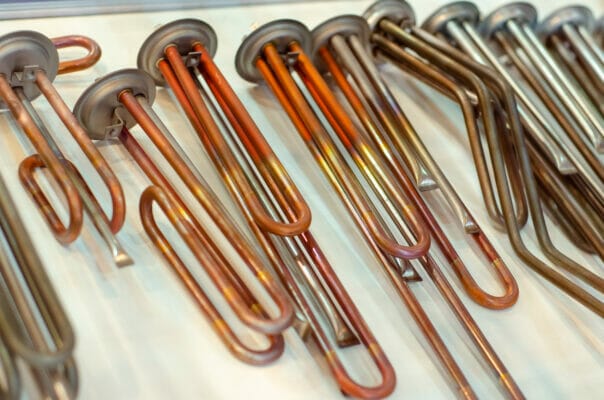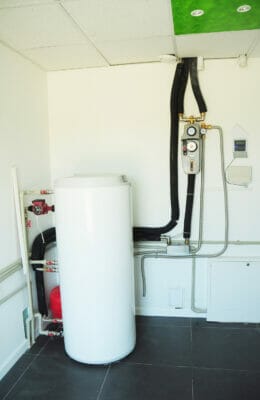Disclaimer: This post may contain affiliate links, meaning we get a small commission if you make a purchase through our links, at no cost to you. For more information, please visit our Disclaimer Page.
A bad water heating element will use more electricity. A faulty water heater whose heating elements are dirty or if the tank has built-up sediment will use up more energy to maintain the right amount of temperature.

Table of Contents
Can A Bad Water Heater Affect Electricity Bill?
A bad water heater affects the electricity because it uses up more energy than usual. As you constantly use your water heater, especially if you live in an area with hard water, lime or sediment will gather at the bottom of the water heater.
As a result, there will be calcification of the heating elements in your water heater. The calcified heating elements are the ones that lead to high energy consumption during heating leading to high electricity bills.
Calcified heating elements act as thermal insulators between themselves and the water being heated; like a wall. This thermal insulation means that water would take longer to heat up due to the slow heat transfer from the heating elements to the water. The longer it takes for the water to heat, the more electricity is spent.
Even if the thermal insulators hold on to some heat during the heating process to keep the water hot or warm, the fact still remains that you used more power than usual during heating.
Another downfall is that the heating elements will also deteriorate because of overheating. The thermostat shut-off will be delayed because the water takes longer to reach optimal temperatures, so the heating elements themselves will experience overheating and wear off.
Overheating also increases electrical resistance within the water heater, reducing its power in Watts. As a result, the heater will prolong its heating time to low wattage.
Can A Leaking Water Heater Increase Electricity Bill?
Hot water leaks can increase your electricity bill. It is a common reason for spiked-up utility bills. If you notice hot water leaks from the pressure and temperature release valves, the probable equivalent is running hot water 24 hours a day.
As the hot water leaks, electricity is still being used to heat the tank, and the cost of your electricity bill will be higher than usual. Not only does your electricity bill go up, but your water bill too due to wastage of water.
You can fix leaking pressure and temperature release valves by replacing them. A build-up of sediment can corrode your tank and cause leaks. The inlet and outlet connections in your water heater can also leak because they are loose, but they are easy to fix as you can tighten them with a wrench.
The most complex water leak to identify would be for a water heater located under your home. If you notice a warm patch of water around the water heater’s spot, it could indicate a hot water leak.

What Are The Symptoms Of A Bad Water Heater?
Sometimes your water heater may appear to be functioning well, when in fact, there are underlying damages that make your water heater elements go bad and get worse by the day.
Knowing the signs of a bad water heater is important because you will know whether to replace it or simply fix it. Either way, you will save a lot of money on electricity and water bills that get diminished due to water heater malfunctions.
The first thing to think about is how long your water heater should last. Most water heaters last between eight to ten years. If yours has surpassed this mark, you might want to consider inspecting it for faults.
Rusting
When your water tank begins to show signs of rust, it is time to replace it as it is going bad. The rust can occur in the water, inside the tank, and outside the tank.
Most water heater tanks are made out of stainless steel. Stainless steel tends to corrode with frequent exposure to moisture.
Once a section of the water heater gets rust, it spreads from one spot to another, and the ripple effect is leaking throughout different parts of a water tank.
Whether the rust originates from your water heater tank or the pipes connecting it to the faucet, it is still a red flag that needs to be addressed.
Rusty Water
When you notice rusty water coming out of your faucet or showerhead, your water heater is rusty. Rusty water can be a health hazard, so it is best to replace the water heater.
Rusty Inlet and Valves
If you see rust on your water heater’s water inlet or around the pressure valve, it is time to consider a replacement. There is a high chance that rust has also developed within the tank.
Rusty Pipes
If water from your faucet comes out rusty, the problem might be rust within the pipes, either due to the pipe’s materials or corrosion due to age.
To determine whether the rust is coming from the pipes or tank, drain several buckets of water and wait until the rust clears. If the rust does not clear, then the problem is within your water heater tanks.
Water Leaking
Water leaking from your water heater is a tell-tale sign that your water heater is deteriorating.
While some leaks are minor and fixable, some actually require the replacement of either valves and, in some instances, the entire water heater.
Water heater leaks can cause serious issues not just with your water heater but also in your surroundings. The water can destroy floors, carpets, furniture and cause the growth of mold within the rooms.
The issue also extends to raising your utility bills; that is, water and electricity bills because the water is being wasted and extra electric power is spent heating wasted water.
Water Not Heating
The sole purpose of a water heater is to heat water. If this function does not work, then it is a symptom of bad water heating elements. You can check your thermostat adjustment and ensure it is at the right level of between 120 to 140 degrees.
A broken heating element is also a culprit for cold water coming out of your outlets. A plumber can diagnose this issue and have it replaced.
If your water heater is old, you may reconsider buying another one because an old water heater will be likely to break down in another way, causing more frustration.
Noisy Water Heater
Water heaters are generally quiet, while some emit rumbling noises as usage increases. While a slight murmur is normal, loud or excessive noise could signify a bad water heater.
Sediment buildup is a major cause of noisy water heaters. The build-up of these minerals increases with time, and eventually, they harden and spread all over the tank floor.
The water heater will be under strain as it will have to use more energy to produce the preferred water temperatures.
Prolonged heating will also wear out the tank and cause brittleness. When you use the water heater after this, the tank will be susceptible to cracks, and water will start leaking, producing another problem.
If you notice these noises early, you can inspect the water heater and point out the issue to your plumber for fixtures. If not, you will need to replace your water heater.
